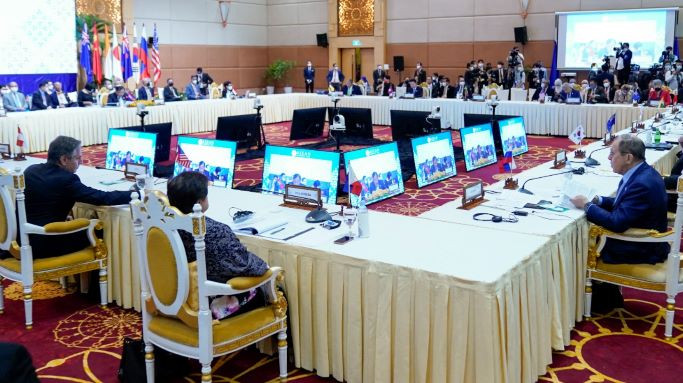Popular Reads
Top Results
Can't find what you're looking for?
View all search resultsPopular Reads
Top Results
Can't find what you're looking for?
View all search resultsHow Indonesian chairmanship can revitalize ASEAN centrality
Admittedly, the great powers will not settle their differences through ASEAN mechanisms, nor will ASEAN now somehow magically be able to address contentious issues or reset its relations with China and the US.
Change text size
Gift Premium Articles
to Anyone
A
SEAN’s role as anchor of regional multilateralism, its convening power and ability to amplify the voices of ASEAN member states (AMS) in pan-Asian regionalism, the essence of ASEAN centrality, is under immense stress.
This is not least due to snowballing – and increasingly zero-sum – great power competition. The various Free and Open Indo-Pacific (FOIP) concepts out forward by the US and its partners are visions of confrontation with China, directed at Beijing’s increasing assertiveness. A gradually polarizing, binary Indo-Pacific pulls ASEAN members into different directions, making consensus more difficult to attain. Internal difficulties, too, tarnish ASEAN’s reputation, such as the inability to effectively address the Myanmar problem or failure to coordinate regional COVID-19 management.
As a result, there is a sense among ASEAN’s dialogue partners – and indeed ASEAN members – that the established ASEAN-led multilateral architecture is inadequately equipped to address the region’s many daunting challenges. This is partly due to a misunderstanding of ASEAN purpose, objectives and capacities. Nonetheless, the sense that centrality is superfluous is gathering momentum.
That frustration is driving a proliferation of minilateralism among regional middle powers, from Quad and AUKUS to bi- and trilateral strategic partnerships.
To the governments involved, the benefits of minilaterals are obvious: they are targeted, ad hoc arrangements among an exclusive club of self-selecting, thus likeminded, partners. They are effective, cheap and non-committing. Multilateralism on the other hand is tedious, slow and often delivers only sub-optimal results, if any. But the main idea, indeed the great promise of multilateralism is the pacifying effect of process-driven inclusivity. Multilateralism encourages inclusive dialogue and mediates estrangement among relevant stakeholders across political divisions. The challenge for ASEAN is that increasing minilateralism risks entrenching regional polarization by excluding alternative voices and eroding ASEAN-based multilateralism. Ironically, this makes the supposed demise of ASEAN centrality a self-fulfilling prophecy.
It is in all AMS’ interest to reassert their voice in regional affairs, and ASEAN’s unique strength is its role as a “safe-house” where inclusive diplomacy can take place. It must, thus, be ASEAN’s ambition to maintain an atmosphere of dialogue among all – including the great powers US, China and Russia – thereby shifting the regional narrative from polarizing rivalry to inclusive cooperation.
ASEAN has moved beyond its Outlook on the Indo-Pacific (AOIP). But the Indonesian chairmanship can build on AOIP’s narrative of inclusivity and functional cooperation – a refreshing counter-narrative to the confrontative exclusivity of FOIP. Cambodia, and Vietnam before it had successful chairmanships. But these were understandably preoccupied with and limited by the COVID-19 pandemic. Indonesia, the largest and most consequential AMS, assumes the first post-pandemic chairmanship and has a unique opportunity to once again be the flag-bearer of ASEAN agency. It can advance a shared ASEAN outlook for a regional order based on open-ended, inclusive multilateralism in the tradition of open regionalism, in terms of both participants and issues.
Thus, 2023 could become the year in which ASEAN both advances its vision of an inclusive, multipolar regional order and complements it with actual policy. A good start would be an ASEAN ministerial conference on the future of regional order and how ASEAN can assure to have its voice heard. Modelled after the recent forum by the French presidency of the Council of the European Union, seeking to translate the EU Indo-Pacific strategy into something tangible, this ASEAN ministerial conference should seek to develop a new outlook for regional order.
Ideally, this would be hosted in early 2023 in Bali in order to capitalize on both the early momentum of the Indonesian chairmanship as well as the Group of 20 meetings and the traditional reputation of Bali as a place where important ASEAN milestones have been set.
In practical terms, the conference would first produce a shared and indigenously conceived ASEAN Interpretation of Regional Order, followed by an open invitation to key dialogue partners to flesh out concrete policy proposals. Targeted working groups should devise implementation plans for targeted projects relating to issues such as post-pandemic economic recovery, sustainable connectivity and the peaceful and sustainable management of resources and the regional commons.
Despite frequent claims to the contrary, the so-called “low-hanging fruits” of Asian regionalism are far from plugged. There can be no major disagreement on important items such as increasing ASEAN’s food and energy security, working on sustainable development of the Mekong sub-region, resetting the post-pandemic economy according to greenhouse gas reduction principles and more.
These initiatives are beyond specific national sensitivities, and effective outcome-oriented projects would help to reinsert ASEAN into regional cooperation and demonstrate that multilateral processes can deliver tangible results that directly improve citizens’ wellbeing and prosperity. Also on the agenda should be the role of existing ASEAN mechanisms, especially how the ASEAN Regional Forum can be reinvigorated as the most inclusive strategic multilateral forum and an important pillar of ASEAN centrality.
The core element of ASEAN’s endeavor should be inclusivity, transcending the binarism of Indo-Pacific competition. This can help to pacify the Indo-Pacific discourse, hitherto biased towards the containment of China. For this to be successful, ASEAN must be impartial in all questions of great power competition, and its multilateralism must be inclusive of all relevant regional great and middle powers.
Admittedly, the great powers will not settle their differences through ASEAN mechanisms, nor will ASEAN now somehow magically be able to address contentious issues or reset its relations with China and the US. But this conference would progress ASEAN’s AOIP vision from promises and fluffy jargon to concrete deliverables and could, thus, become a break-through moment for the future of ASEAN centrality. ASEAN autonomy should seek a “third way”, helping to build a bridge across a polarized region.
ASEAN now requires forward-looking leadership, which Indonesia has provided more than once. Indonesia’s President Joko “Jokowi” Widodo, often said to be disinterested in foreign policy, has lately become an active diplomat and regionally respected leadership figure. He now has an opportunity to cement his foreign policy legacy. It is not too late for ASEAN centrality, but there is no time to waste, and an Indonesian chairmanship only comes once in a decade.
***
The writer is research fellow and lecturer at the S. Rajaratnam School of International Studies (RSIS), Nanyang Technological University (NTU), Singapore.











